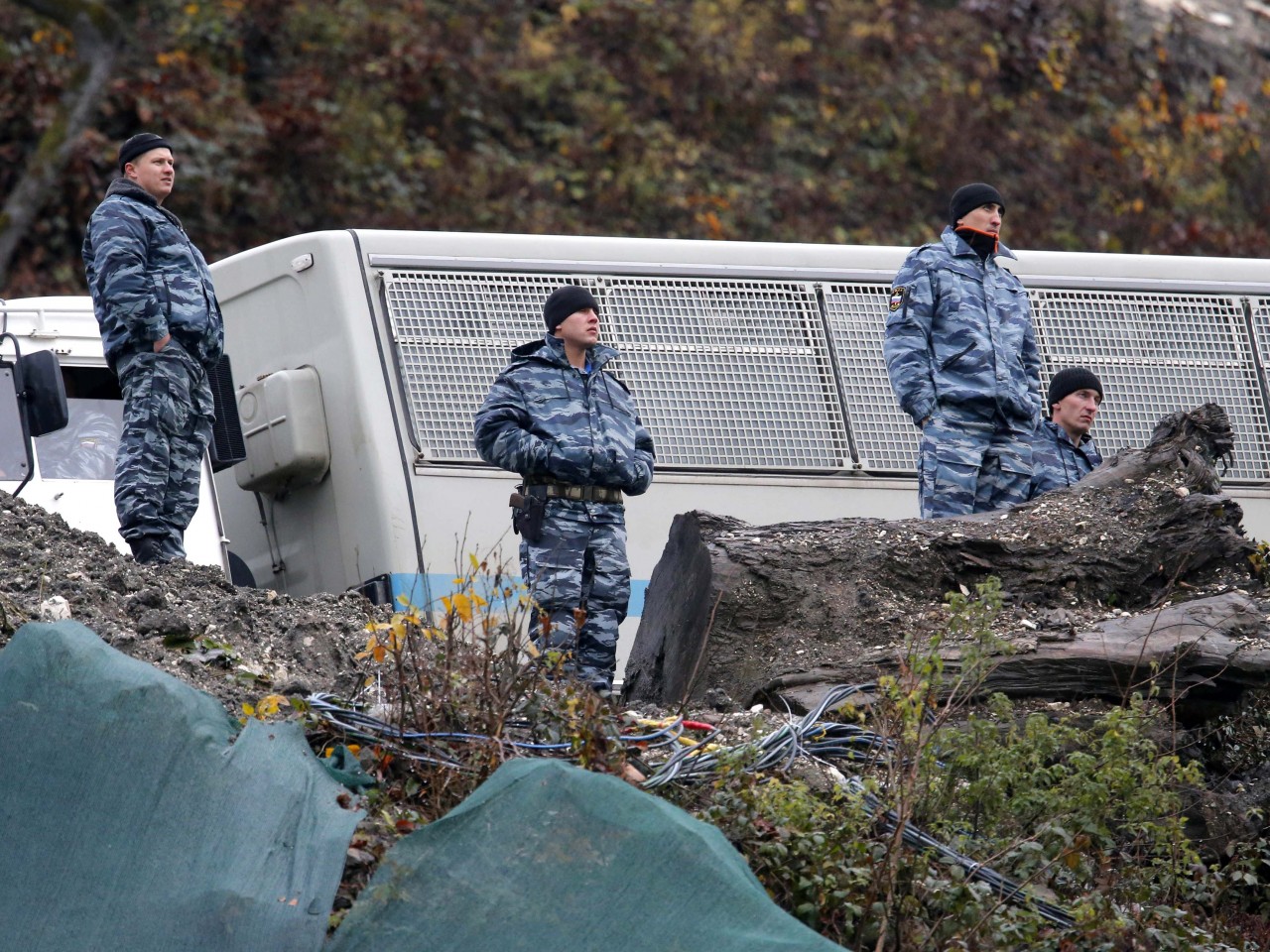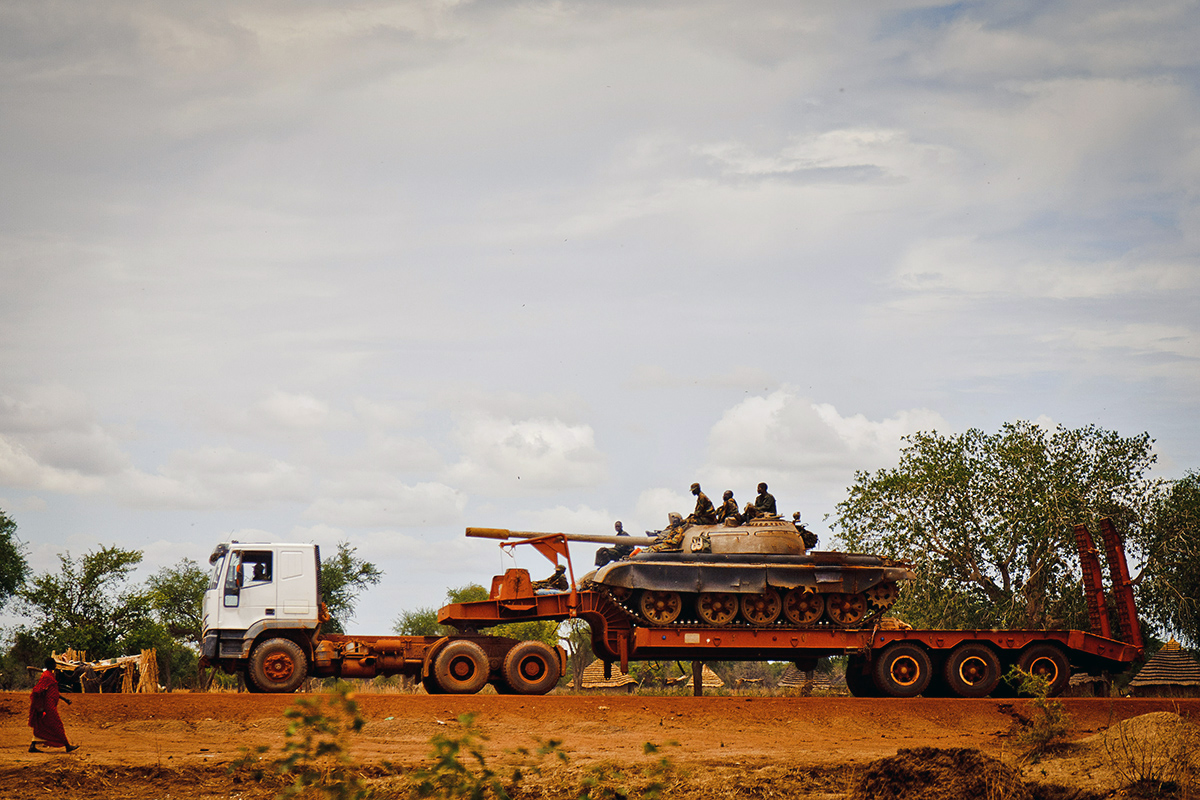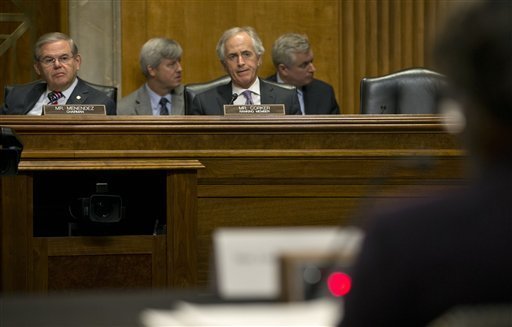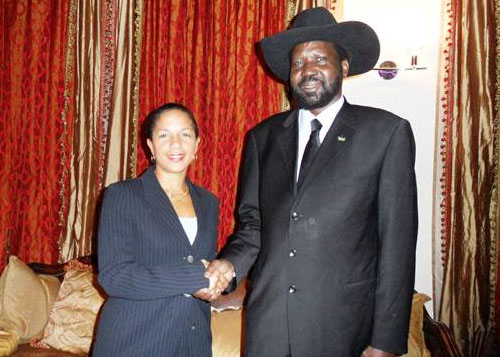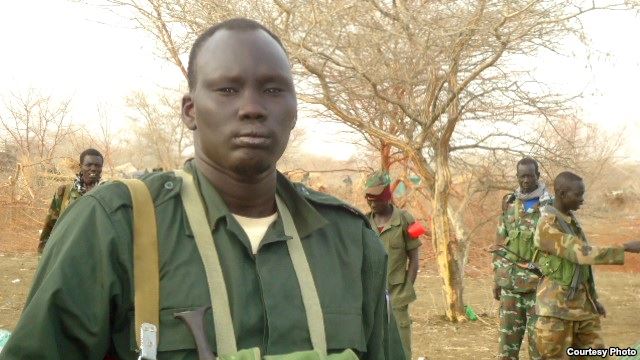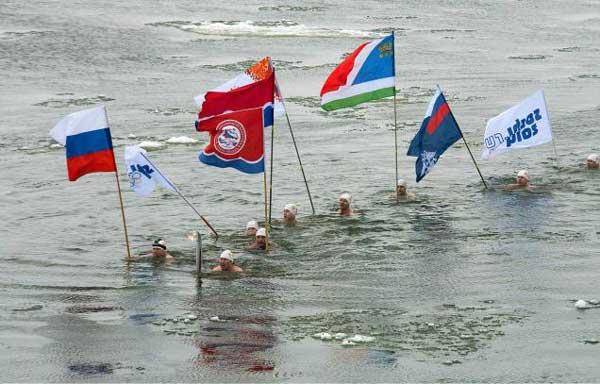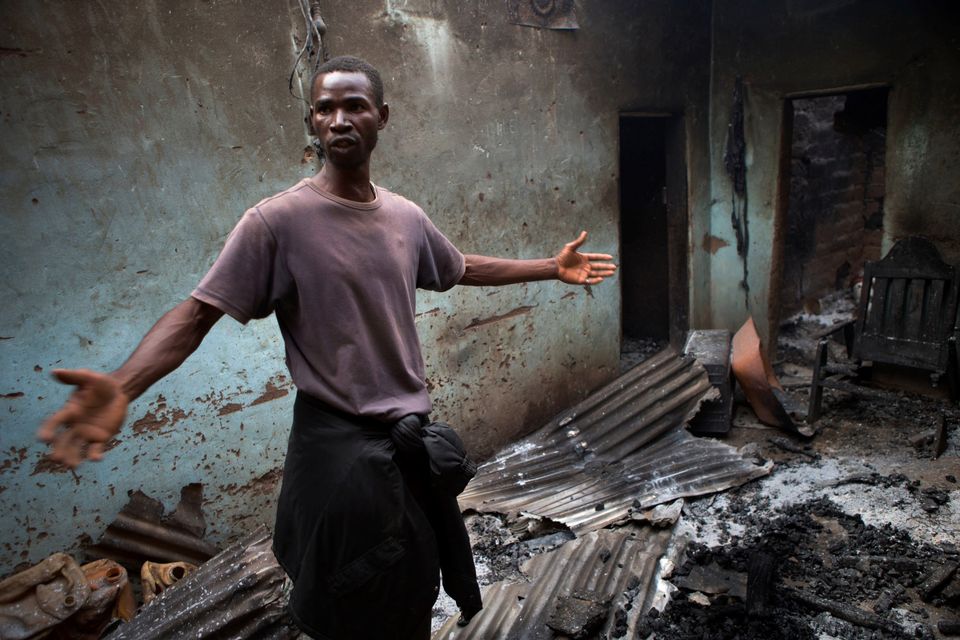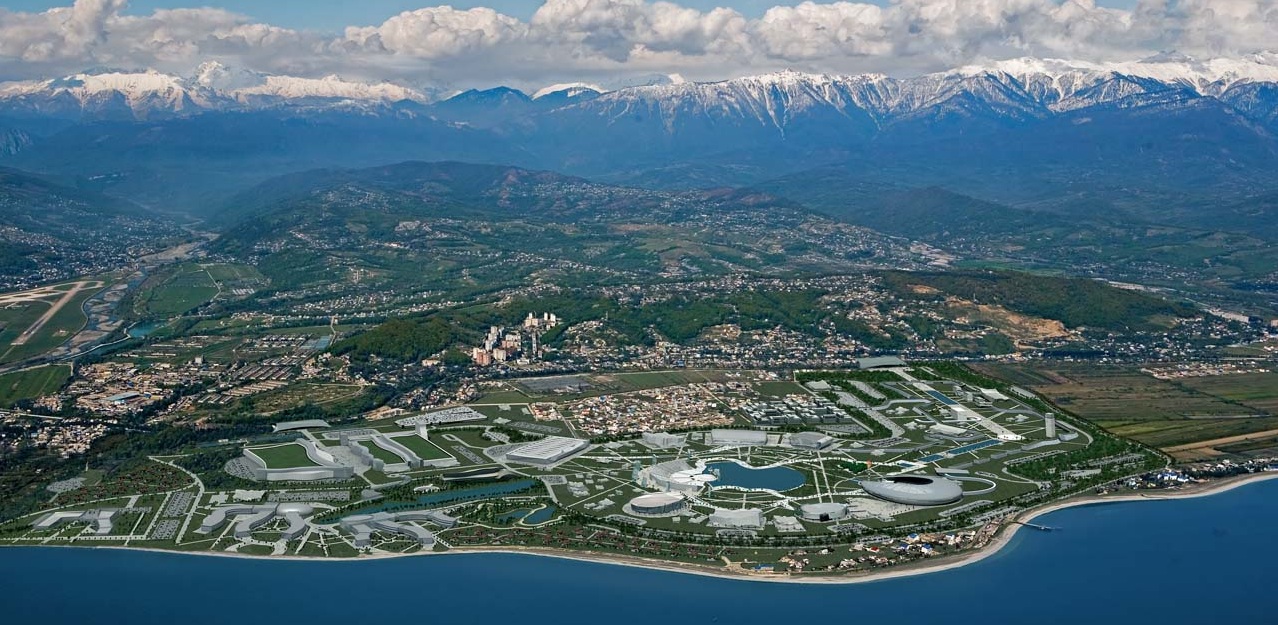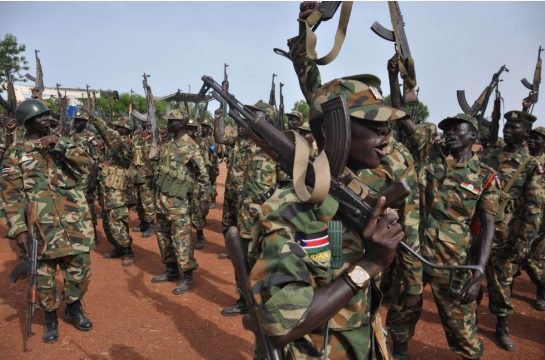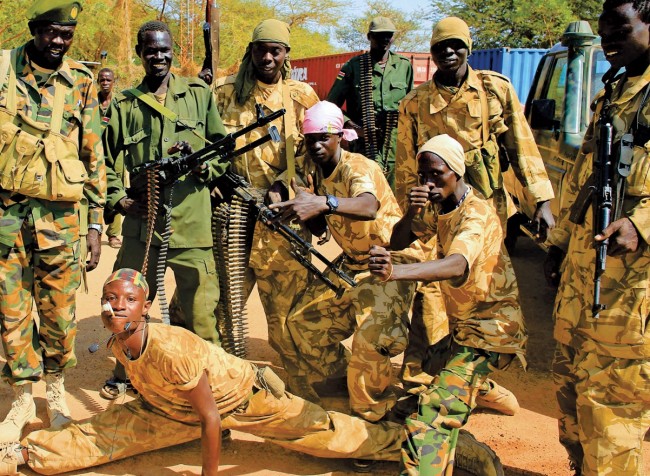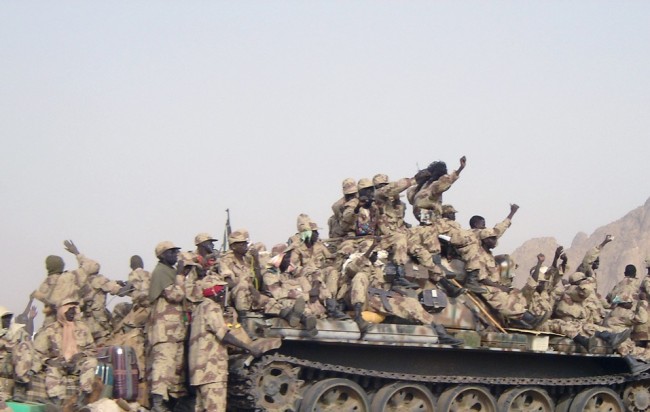Battles continued along the Juba-Bor road as President of Sudan Omar al-Bashir met South Sudanese President Salva Kiir. China also finally entered the stage of the South Sudanese crisis.
After incidents of gunfire Saturday evening in Juba’s Qiyada barracks and Jebel market, the government announced that it would hold a press conference Sunday morning to explain the events. No specifics were given as to who was involved in the gunfire incidents, but government spokespeople stated that no substantial group of rebels was involved.
In Juba, at the residence of a senior SPLA commander, a gunfight broke out at around 6 p.m. Saturday evening, according to Radio Tamazuj. Several bodyguards were killed and Lam Dak, the owner of the Tong Ping residence, fled the scene. Several bystanders were injured at the UNMISS compound nearby. Tong Ping himself was admitted at the UNMISS compound after surrendering his weapons.
According to sources of Radio Tamazuj, shots fired at Lam Dak wounded eight refugees inside the UN compound and killed one child. One of the refugees wounded was left in critical condition.
Also in Juba Saturday night at 1:30 a.m. National Security forces searched the house of MP Kong Dak Jishlive. The forces seized computers, other assets, and three vehicles from the house but did not arrest Dak.
Dak represents Leer in Unity State and is seeking refuge with the UN in Juba.
Bor is still the scene of continuing battles.On Sunday an SPLA convoy was moving towards Bor when rebels ambushed the convoy. The convoy was 15 miles (25 kilometers) South of Bor on the Juba-Bor road at the time, near the town of Pariek.
On Sunday an SPLA convoy was moving towards Bor when rebels ambushed the convoy. The convoy was 15 miles (25 kilometers) South of Bor on the Juba-Bor road at the time, near the town of Pariek.
SPLA general Abraham Jongroor Deng was killed in the rebel ambush at Pariek.The SPLA officer in charge of the Bor operation, Lieutenant General Malual Ayom Dor, also the SPLA Deputy Chief of Staff, had been reported by some press organizations as killed in the Pariek battle, but Malual is alive and well.
The SPLA officer in charge of the Bor operation, Lieutenant General Malual Ayom Dor, also the SPLA Deputy Chief of Staff, had been reported by some press organizations as killed in the Pariek battle, but Malual is alive and well.
The SPLA has been attacking Bor for several days. The government has been continually reinforcing the army pushing for Bor. There are currently 2000 SPLA soldiers involved.
A division of the SPLA has defected to the rebel side, so both sides of the Bor fight are now manned by trained soldiers.
UN vehicles have been commandeered in Bor, according to the UN.
Currently, the Juba-Bor road is lined with dead bodies and all villages are deserted.
Elsewhere in South Sudan, reports have come in relating local events.
In Unity State, Rebels in Bentiu have taken control of a UN food warehouse in that city.
In Upper Nile State, officials are trying to convince Sudan to reopen the border in order to get foodstuffs into Upper Nile. Malakal was looted after a large battle and food and other merchandise has been in short supply.
In Yei and other regions, SPLA soldiers defected from the government.
Soon after the gunfire incidents took place in Juba, 120 SPLA soldiers in Yei defected and headed for the forest. There was fighting in the Yei barracks at 9:30 p.m. and there was a clash with pursuing government SPLA later Saturday night.
Also in Central Equatorial State, 30 SPLA soldiers defected from the government in Morobo.
In the Western Equatorial State city of Mundri an unknown number of SPLA soldiers also defected. The defectors commandeered the vehicles of business people and looted Mudri, then proceeded to Lui where the defectors also looted, then did the same in Jambo. SPLA soldiers pursued the defectors.
Lui and Jambo are on the Mundri-Juba road. Mundri is a city 200 kilometers west of Juba.
Aguer said of the defections, “Defection is part of armies emerging from a post-conflict state. That is not a signal of collapse,” he said, noting that the runaway soldiers fled to the forest and did not occupy any areas.”
Aguer stated that the blame for the defections was on “telephone calls to Juba,” and commented on the use of the phone as a tool for misleading people. Aguer said that the defections came after SPLA in Yei were told that Juba was being attacked.
Peace negotiations in Addis Abada were rescheduled once again. The scheduled date is again “tomorrow.”
Peace talks have been held up by, according to officials, “protocol issues” and demands made by the rebel group. The focus of preliminaries was therefore on procedures and non-controversial matters, according to BBC reporter Lam Akol.
But the preliminary process of the talks was announced to have been accomplished Monday afternoon.
After the meeting, Seyourn Mesfin, head of the mediation team, told reporters that the opposing delegations had progressed to the point where they could negotiate.
“What we have done today is finalize the framework of conducting talks,” said Mesfin.
The agenda will focus on ceasefire, political prisoners held in Juba– which prisoners the rebels want to see freed–the initiation of political dialogue and access for humanitarian agencies.
However Sunday South Sudanese Information Minister Michael Makuei repeated the government’s position that the government would not release the prisoners, despite rebel demands. Makuei stated that the government would not accept such a demand as a precondition for peace talks.
“We are not ready to negotiate on preconditions. This is why we are here. The question of the releases should not be annexed to the successful peace talks. We came here to talk peace without conditions and to come and tell us that ‘release these people so that they talk’ is a condition and we are not ready to accept any precondition.”
Ceasefire progress has happened, though, with another rebel group.
David Yau Yau agreed to a ceasefire with the government which began at 11:00 p.m. Monday in Jonglei State, as announced by the South Sudan Ministry of Defence.
Yau Yau had been fighting the government for two years. Yau Yau has troops in Jonglei state, and there was suspicion Yau Yau might join the rebel forces there, greatly strengthening Machar’s opposition.
Yau Yau’s fight, according to Yau Yau, is not to overthrow the government but to win greater rights for his tribe, the Murle.
Sudan has become more involved in the South Sudanese conflict.
Sudanese President Omar al-Bashir flew to Juba to visit Kiir briefly Monday.
Bashir announced that Sudan will not support the South Sudanese rebels or rebels in any neighboring country, which, Bashir said, “would only cause instability, exhaustion of resources and destruction of ties between countries.”
Bashir also stated that Sudan would give full protection to South Sudanese refugees in Sudan: “South Sudanese fleeing the fighting are welcome and free to live in any part of Sudan.”
President Kiir thanked Bashir for the visit and the Sudanese assistance during the “disaster of the last two weeks.”
Kiir stated that Bashir’s visit confirmed the strength of relations between Sudan and South Sudan.
The visit was significant because Sudanese and South Sudanese have in the past accused each other of sponsoring rebels in each others territory.
Uganda’s is helping South Sudanese, and providing aid to the South Sudanese government.
12 000 refugees have sought refuge in Uganda since mid-December, according to Ugandan authorities. Most of these refugees are being hosted in settlement camps, since they have no connections in Uganda.
Uganda is providing the refugees with water, food, sanitation and shelter, and in some locations is planning to provide hepatitis E and polio immunization to prevent an epidemic.
The Ugandan army’s Paddy Ankunda stated that Uganda was deploying more troops to South Sudan because the security situation in South Sudan had worsened. Ankunda stated that the troops were only there to secure stranded Ugandans.
Ugandan forces patrol Juba’s airport. This duty was accepted after Kiir invited Uganda to do so.
Rebel delegates to the Addis Abada meetings have repeatedly complained of Ugandan forces and gunships attacking rebel positions.
Heavy military equipment was also seen being transported from near the Ugandan border town Atiak towards central South Sudan.
U.S. and UN personnel have been evacuated from embassies and bases in South Sudan over the past week. The South Sudan government recently criticised the U.S. and UN for these measures, calling them “alarmist and unneccessary.”
Antony Wek, government spokesperson, stated, “in fact there is nothing grave in the situation.” The government is warning observers not to be misled by the propaganda war Wek says is assaulting South Sudan.
U.S. diplomat John Kerry recently made a statement regarding the U.S.’s position to South Sudan support oppose to the effect that the U.S. would help any peaceful actions but would oppose any violent ones.
The UN recently deployed three helicopter to Juba, on loan from the UN mission in the DRC. The Bengladesh-made military helicopters will be use to transport UN personnel and equipment.
The humanitarian situation is worsening in degree and scope, but humanitarian aid is increasing to meet the need.
Disease is a major threat.
UN High Commissioner for Refugees announced in December that at least 6000 people in South Sudan had contracted hepatitis E in refugee camps.
The UNMISS compound in Juba houses the largest amount of refugees.
Another 1000 refugees arrived in Juba after the shooting incidents Saturday night. The mass of refugees in the compound has not left despite relative calm in city since the initial outbreak of violence in December.
In Bor, supplies re running low for the 9000 refugees being sheltered by UNMISS. Due to the constant fighting around Bore, resupply is becoming an issue. Bor’s medical capacity is being overstretched.
China has entered the South Sudan crisis, as violence continues along the Juba-Bor road and as the President of Sudan meets President Kiir.
China is planning to hold talks with the representatives of the two opposing forces. These talks were expected to take place Monday in Addis Abada.
China’s Foreign Minister Wang Yi is currently touring Africa, including Ethiopia, and it is Yi who will participate in the talks.
Last December, Chinese Special Envoy to Africa Zhong Jianhua also made statements calling for peace talks when Jianhua visited South Sudan.
China is the number one international investor in South Sudanese oil. China recently evacuated some Chinese workers from Chinese state-owned oil companies China National Petroleum Corp and Sinopec.
News in South Sudan is under threat.
The two biggest daily newspapers in South Sudan, The Citizen and Juba Monitor, threatened a blackout Saturday. The threat was in response to directives made by the South Sudan government’s Information and Broadcasting department. The papers are claiming that the government made extralegal demands on the news agencies.
Newspapers published front page articles that all South Sudanese news agencies would agree Thursday to boycott the government, threatening South Sudanese people who rely on these agencies for information about developments such as the violence along Juba-Bor road, the President of Sudan meeting with President Kiir, and China entering the crisis.
By Day Blakely Donaldson
Sources:
Guardian LV
BBC
Voice of America
Voice of America
Voice of America
Radio Tamazuj
Radio Tamazuj
Radio Tamazuj
Reuters
UN
BBC
BBC
Gurtong
